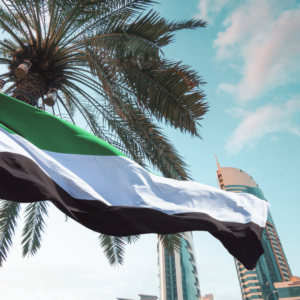Middle East telecom news is always of keen interest to the wider industry, as the region is increasingly seen as a bellwether for innovation. Telecom networks have grown to become some of the most valuable brands in the region. As operators take advantage of regulatory shifts and increased autonomy, they find themselves in a position to compete on a global scale.
Industry analysis indicates that telecom operators need to increase the pace of their own strategic evolution. This will enable them to take advantage of the changing business landscape and position themselves as leading digital transformation partners and service providers. Here, we’ll explore the latest developments in the Middle East telecom industry with insights from Outvise’s MENA partner, Shabkhez Mahmood.
You can hear more of his observations on the future of telecoms in the MENA region on episode two of the Outvise Insights podcast, The Telecom World in the Middle East – More Than Just a Commercial Deal, available on Spotify, Apple, Google and Amazon podcasts. For the essential briefing, read on.
Table of Contents
A weathervane for digital futures
The Middle East, and in particular the countries which make-up the Gulf Cooperation Council (GCC), are of substantial interest to the global telecom industry. Regional players have been early adopters of new technologies and hosted a wide array of innovative products and global experiences. For instance, projects like Neom, the smart city that the Saudis are building from the ground up, cement the region’s status as a trailblazer.
However, despite the Middle East’s reputation as a future-oriented, tech-focussed society, the digital divide still remains greater than in the West. The PWC Strategy & Digital Economy Index defines even the advanced economies of the GCC as digital adopters, in contrast to the United States and the majority of European countries, which are considered digital disruptors. But the region is rapidly catching up – and in doing so, MENA-based telecom companies are likely to become key service providers for countries throughout Africa and Asia.
Undoubtedly, there is room to grow for the MENA telecoms sector, not only to connect millions more, but also to weather changes in the region’s economy. Shifting demographics, falling oil prices and the effects of the pandemic have driven economic diversification, thrusting telecom into the limelight. Reflecting a little more on the history of this shift warrants some discussion.
The move away from oil and the release of state control
Since the end of the Second World War, large-scale oil production has been the backbone of the Middle East’s economy. Today, about 39% of the world’s crude oil is drilled in the region. But as oil prices drop and more and more people turn to renewable energy as a sustainable solution, Middle Eastern countries must find alternative economic strategies – and fast.

The pandemic made the need to diversify particularly urgent. As oil prices plummeted during the first wave of COVID, local telecommunications networks were simultaneously placed under strain by the sudden spike in usage during quarantine. This two-fold demonstration of the instability of an oil economy, alongside the consumer demand for more digital infrastructure, has expedited the need for transformation in the telecoms industry. Subsequently, regional telecom players have the opportunity to play a significant role in the diversification and digital transformation of the public and private sectors.
A further key development is the gradual relinquishment of state control over the last few decades. Until the early 2000s, telecom operators throughout the Middle East were wholly or significantly owned by the various nation states. But over the last twenty years, many of these companies have gone public. So while governments and sovereign wealth funds still remain some of the largest investors in the telecom industry, their participation is increasingly expected to be on more commercially viable terms.
A demographic-driven demand
Demographics also play an important role in the development of telecommunications in the region. In the GCC, for example, foreign nationals make up a considerable percentage of society – non-citizens make up around 88% of the population of the UAE and Qatar, for example. Many arrive in the big cities of the GCC from South Asian countries such as India, Bangladesh and Pakistan, or from other territories in the Middle East, in search of work.
Living at a distance from their families and only able to return home infrequently, workers depend upon reliable telecoms to keep in touch with their loved ones – something that has been challenging in light of the major regulatory restrictions that these countries have historically placed on VoIP applications, including popular voice and video calling services such as Skype and WhatsApp.
Over the past five years, these regulations have been easing: Saudi Arabia lifted its ban on some of the VoIP applications in 2017, while the Telecom Regulatory Authority of Oman lifted restrictions on VoIP calls in 2020, allowing access to previously inaccessible apps such as Skype and Zoom as a response to the pandemic. This is major news for the Middle East telecom landscape: it provides great benefits to customers but poses challenges to operators, who previously enjoyed a degree of protection from these large international service providers.
An emerging free market of telecoms operators
Though many countries still enforce restrictions on VoIP applications and OTT providers, these moments in Middle East telecom news indicate a trend towards a more relaxed approach to regulation. The mix of services is changing, with the opportunity to penetrate new spaces.
This has fueled the emergence of new incumbents across the region. For example, if you’d asked “how many telecom companies are there in Saudi Arabia?” in 1999, the answer would have been one, STC, the state provider. Since 2002, many more providers have entered the ring, including Mobily and Zain to name but a few.
This liberalisation of the market has opened an opportunity for more diverse regional and international players. This includes hyperscalers, OTT and ICT service providers who are increasingly growing their operations in the region. In response, regional telecom providers must act rapidly to expand their capabilities. However, this isn’t to say public and private interests alike are reacting.
In a show of support for its telecoms industry, the UAE has made it a priority to bring fast internet to its population, targeting 5G coverage of all inhabited areas by 2025. Etisalat – recently rebranded as e& – is currently driving rollout and densification of 5G networks across the region. Competition is hotting up, and the answer to the question “which is the fastest network in the UAE?” is in constant flux; but as of October 2022, the Speedtest Global Index placed e& not only as the fastest network in the UAE and surrounding countries but as the second fastest network in the world.
Other operators are also making big moves in response to softening of regulations and ramped up competition. For example, Ooredoo Kuwait has dramatically streamlined its digital services to differentiate from the competition. Through measures including more personalised customer experiences in the app, Ooredoo Kuwait has increased digital solutions revenues from 1-2% to 5-7%.
The regulatory landscape is improving, increasingly enabling telecoms to provide innovative fintech services aligned with international trends. Many regional telecoms have been awarded banking and fintech licences to launch their own digital banks and enhanced wallets.
The knowledge gap
Certainly, there is incredible opportunity in the region. However, one of the main factors which limits the continued growth of Middle East telecoms is the shortage of specialist talent, knowledge and capacity. International industry organisations have been launched to address this gap in the Middle East by providing information on cutting-edge telecom solutions and how businesses can build future-ready networks. One such is the Fiber Connect Council MENA, of which Outvise is a member.
However, such organisations are not enough on their own: Middle Eastern markets need more native talent. Although the countries in the GCC have made great strides in encouraging people to enter into STEM fields and increasing their pool of young technology graduates, this promising talent understandably still lacks experience. While businesses are able to source workers from the region for many of the less complicated roles, they are not able to meet demand in more specialised areas.
What Middle East telecom news means for freelance talent
If telecom operators want to compete against international players in this new era of relaxed regulations, they will have to develop a diverse range of services and keep expanding into different areas of the telecom ecosystem. For these projects, it makes sense to bring in external talent – international professionals who can bring their expert experience to a team.
When looking for specialist talent, hiring seasoned freelance experts presents major advantages. Freelancers arrive with the mindset of completing a set task and transferring knowledge. This means that they can help businesses grow internal talent by assisting promising local hires to develop the skills they need. International freelancers can bring the specialist knowledge that local teams may lack and can aid telecom operators in enhancing service offering, products and internal transformation.
What the Middle East is realising, along with the rest of the world, is that they can benefit from bringing in specific talent for specific projects. Trusted professionals can help businesses nurture new knowledge by complementing internal talent over the short term to get long-term rewards.
If you’re working in the MENA region, find the expert freelancer you need to take your business forward into the future by consulting Outvise’s portfolio. It could make all the difference to your company’s next venture in the region.
Chartered Accountant by qualification with 20+ years of experience with FinTech and other Technology start-ups, Big4 and blue chip Telecom, Media and Energy sector organisations across Asia, Europe and Africa. Experience of managing P&Ls, large & diverse teams and functions gained in departmental, operational & financial leadership roles.




No comments yet
There are no comments on this post yet.